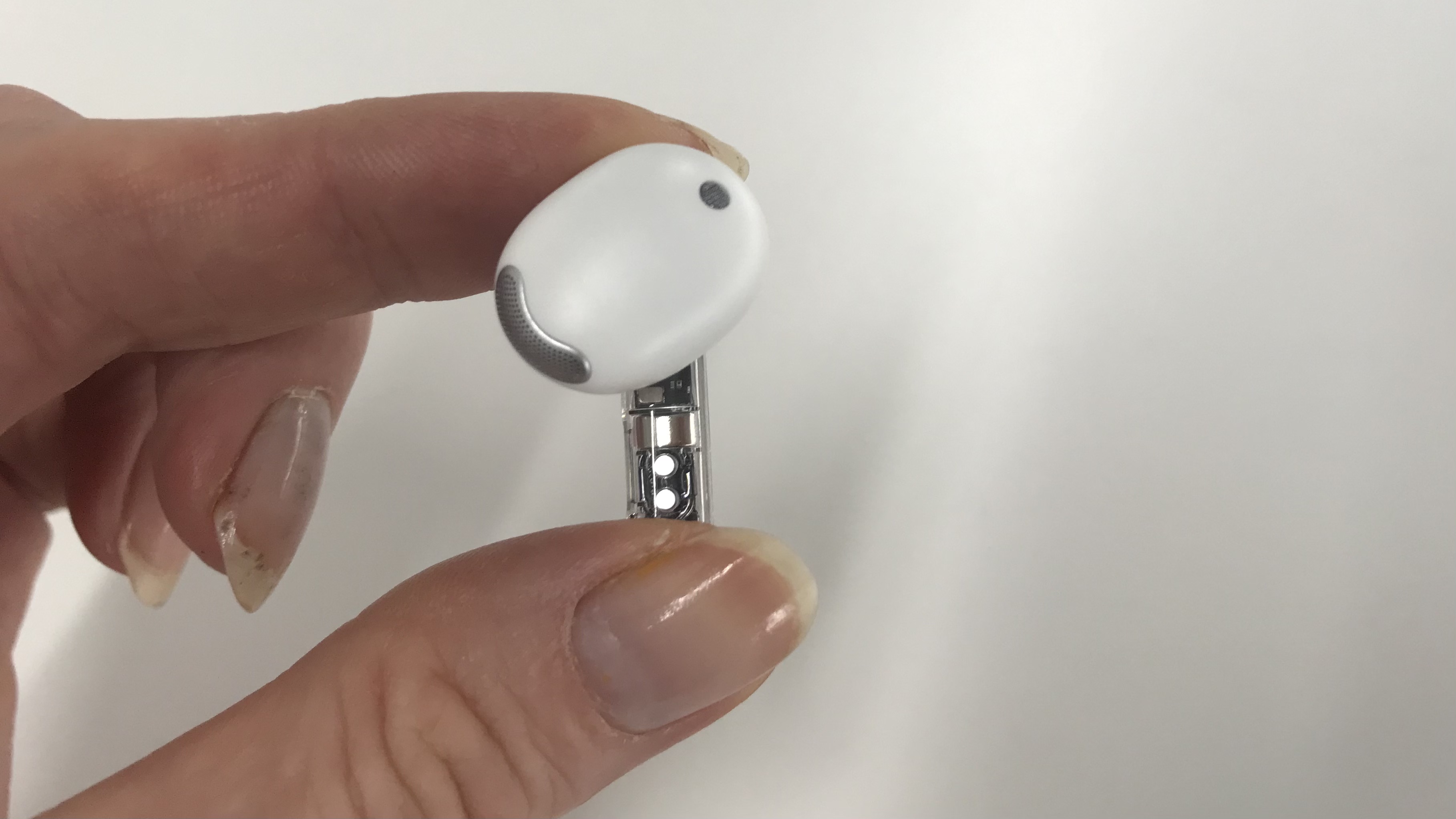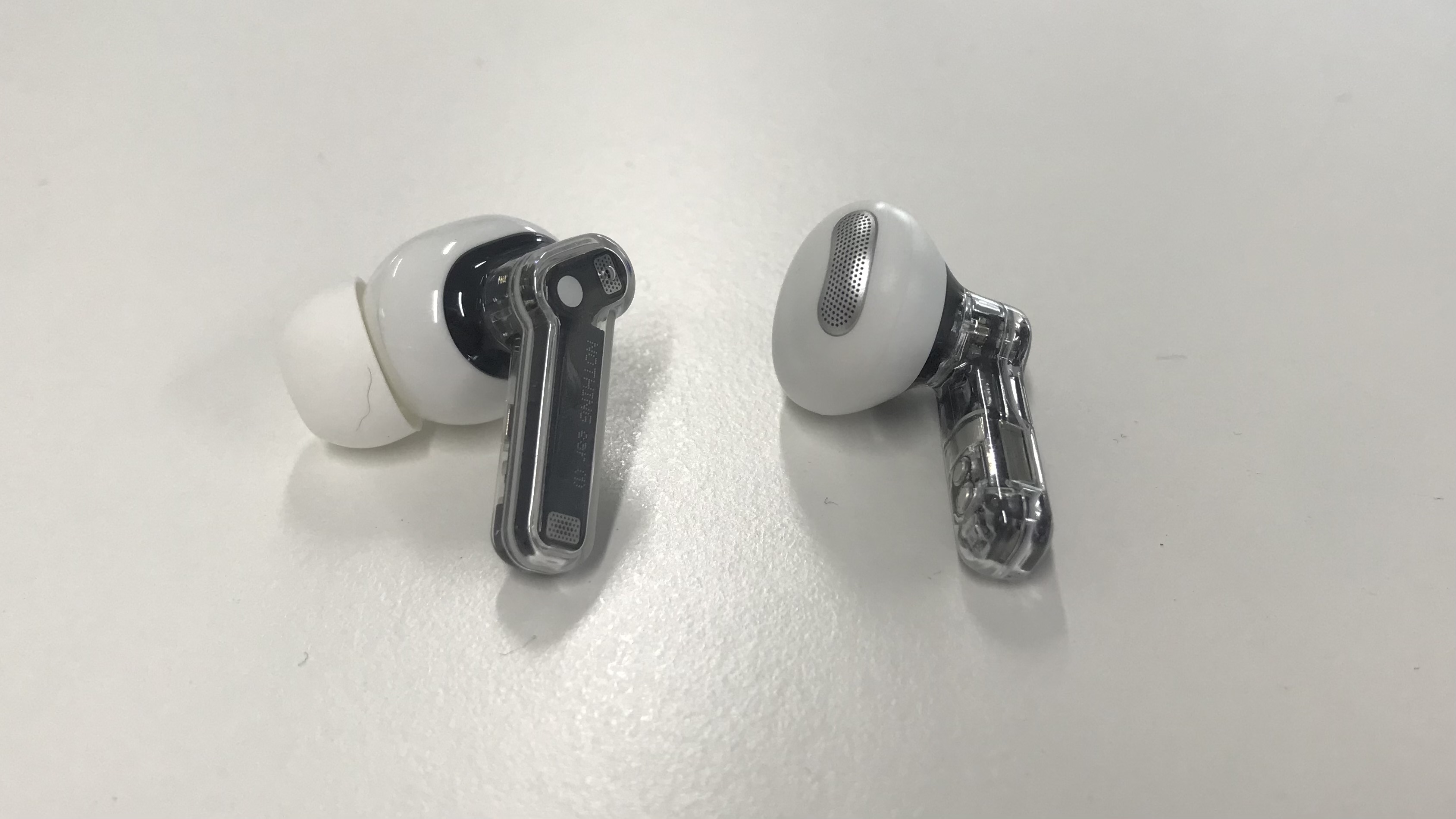Nothing Ear (Stick): one-minute review
Nothing is a forward-thinking tech and lifestyle outfit, very much in the ascendency, and one that should very soon find itself adorning the hypebeast (and hypebae) elite, if it hasn’t already.
Although the company’s inaugural July 2021 earbuds didn’t quite make it into our roundup of the best true wireless earbuds, these have since been joined by a smartphone and now, a second stab at the headphone market – which look and sound even better than before.
What you need to know is that there’s no ANC this time around, but there is an even stronger design language that carries through to the buds themselves. Said earbuds now include a slightly longer stem that you can squeeze to perform playback, call, and volume tweaks. They also have 1mm larger, custom 12.6mm drivers (a stark contrast to the “off-the-shelf drivers” found within the Ear 1) and, consequently, they do boast an improvement in audio performance, particularly through the lower registers.
Whether Apple, Sony, Bose, Sennheiser, or any of the other best wireless earbuds manufacturers will care is debatable. The lipstick-styled case, which also can be spun around if you’re idly waiting (in the same way that the Ear 1’s case featured a fidget-spinner thumb dip) might suggest to some it’s a case of style over substance. Is it, though? Actually no.
With a price of $99 / £99 / AU$179, they’re a lot cheaper than the Apple AirPods Pro 2 but remember, there’s no ANC here, and this is the same launch price as the Ear (1) which of course did feature pretty good onboard noise nixing.
The buds now feature a semi-open-ear design, meaning that they don’t require ear tips or a secure seal within your ear canal. They also weigh just 4.4g, but those with larger ears may find them a little insecure. Do we find them a little leaky as a result? Yes, but the bass has been augmented to atone for that.
Sonically, these are a feisty set of earbuds, delivering a healthy bass clout and adding the energy and excitement you might crave on your commute – and we like that. We also like the updated Nothing X app, which now features a circular EQ tab so you can drag the bass, treble, and mid ranges up and down by six increments, creating your own unique sound ‘blob’. There’s also an improved sense of space and texture.
Sadly, those bigger drivers are a little harder to push and the battery life has taken a knock. The buds offer a claimed seven hours of listening time from the buds and 22 hours from the case (which cannot charge wirelessly but can deliver up to two hours of playtime after just 10 minutes of charging via its USB-C port) for a 29-hour total. For clarity, you’ll get up to 34 hours with the Ear (1) as long as you switch the ANC off.
The Nothing sound is now better, but the design will likely not suit every ear. When we tried to run in them it was not a successful experience. Then again, these are buds to be seen in, and for this money, the sound is very good indeed.

Nothing Ear (Stick): price and release date
- $99 / £99 / AU$179
- Announced October 26, available in stores from November 4
Nothing unveiled the Ear (Stick) officially on October 26, as its “most advanced audio product yet” although, since the ANC has been ditched, we prefer to view them as the company’s mid-tier offering.
Upon seeing that price tag, the keen-eyed will probably think it’s strange that the mid-range earbuds carry the same price tag as the flagship model. As it turns out, CEO Carl Pei recently took to Twitter to announce that the Ear (1) (opens in new tab) will be getting a price hike, up to $149 “due to an increase in costs.”
Whatever’s happening with Nothing’s pricing strategy, that asking fee puts the Ear (Stick) directly in competition with the likes of the excellent Cambridge Audio Melomania 1 Plus. Tough company to keep.

Nothing Ear (Stick): design and features
- Larger 12.6mm drivers
- Three mics per earpiece
- 7 hours of playtime; up to 22 hrs in the case
The Nothing Ear (Stick)’s new stem sensors are a delight to use. The little, clickable silver button is actually on the front edge of the stem, nearest your cheek (rather than on the back edge, as is the case with the AirPods Pro 2), and as such is easier to access. Also, it clicks nicely to register your touch and let you know that your morse-code request of single, double, or long-hold clicks is being dealt with.
The case is also beautifully tactile and playful; the clear plastic outer shell contains a textured white plastic nest, which we enjoy spinning, and the lipstick-red accent on one end (said case is happy on its side or on its end) is a cute touch.
Across the course of our listening, the earbuds did give us fall-out anxiety, though – and that’s despite the fact that the driver housings are relatively big and our ears are pretty small. There’s not a lot you can do about this issue, since there are no tips to add. Nothing explains that the earbuds were designed to sit less intrusively in the ear canal for a naturally comfortable fit, which was ergonomically shaped and tested on over 100 people. We wish we could say we loved it. It’s not terrible, but it’s not the most secure solution we’ve tried.
USB-C charging is the only mode of juicing supported here, which is to be expected at this sub-$100 level. The earbuds themselves boast an unusual IPX7 waterproof rating, however, which will keep them safe even if submerged in fresh water up to a depth of one meter for up to 30 minutes, but take note – the case is not water resistant at all.
Wearer detection and a low latency mode (for improved gaming, say), can be toggled on and off in the likable app for iOS and Android, which also now has a lovely circular equalizer. There is also a useful Find My Earbuds tab, where you click on an image of the wayward bud to trigger it to issue a cricket-like noise, which should help you locate it.
There are a few novel bits of tech to tell you about. First, Bass Lock Technology, aka smart software, promises to measure the user’s unique ear canal shape and the fit of the earbuds, detect how much bass is lost during wear, and automatically tune to the optimal level for the user. And this is a triumph.
Next, Clear Voice Technology, which involves three high-definition mics working together with updated algorithms to filter out louder background noises, amplifying your voice for wind-proof and crowd-proof calls. We do find calls nice and clear, but it’s hard not to comment on the lack of ANC. Ultimately, we think that Nothing’s missed a trick here by not using these mics to actively cancel noise when we’re listening to music, too.
Lastly, Ear (stick)’s redesigned antenna now sits further away from the face in a bid to minimize signal blockage. We’ll be honest, we experienced a few snafus in terms of connectivity, but the product has just launched and we used early versions of the app in our initial tests. Those slight issues have since been rectified.
And there are a few ecosystem perks; when you game on the Nothing Phone (1) for instance, it automatically switches to low lag mode without waiting for you to ask.
- Design and features score: 4/5

Nothing Ear (Stick): sound quality
- Excellent bass clout and snap
- Exciting, fun-sounding soundstage
- Lacks a modicum of refinement, but still a healthy listen
There’s no head-tracked agnostic spatial audio support in the Nothings (as you can get in LG’s Tone Free T90 or the even newer Anker Soundcore Liberty 4) but for excitement and zeal, there’s plenty to love here.
We streamed Start Me Up by the Rolling Stones (yep, going big early) and the raucous sense of Mick, Keith, Charlie, and Ronnie all together is celebrated like it’s 1981. The hand claps are impactful through a healthy treble, but it’s the low end that’s just so much better and more regimented this time around.
INXS’s Need You Tonight is a similar story, as synths and Michael Hutchence’s additional backing vocals come at our ears in a wider, more expressive soundstage than before.

Bruce Springsteen’s I’m on Fire is somber, agile, and with the beautiful, indefatigable drum fill just below our left ear – right where it should be in what is an impressive and cohesive mix.
Switch to the Cambridge Melomania 1 Plus and you lose a modicum of excitement and energy, but in turn, gain an extra ounce of insight and detail through the upper midrange. Remember that whole hi-fi versus high-excitement debate? Rage versus refinement is a little strong, perhaps, but that’s the general idea.
It’s up to you which you prefer, but again, there’s plenty of talented oomph and drive here. It’s likely aided by the new Bass Lock Technology and Nothing’s decision to use the highest grade driver magnets in the market while strengthening the diaphragm to keep things shipshape rhythmically. However you look at it, they’re a solid step up on the Ear (1) for sound-per-pound performance.
- Sound quality score: 4.5/5

Nothing Ear (Stick): value
- Cheaper than the Ear (1), but only because they’ve been hiked in price
- At $99 competition is fierce
As we’ve said before, competition at the affordable end of the market is now nothing short of ferocious, but on design and looks, the Nothing Ear (Stick) is sitting pretty at the top of the pile.
For features, your money can go further elsewhere – the Earfun Air Pro offers ANC and a nicely handled sound profile for less – but in case we haven’t said it enough, the sound quality here is very good for the level.
You can get better, of course, but you’ll have to put down an extra $70 at least – and maybe here, look to the Honor Earbuds 3 Pro, if (if!) you can get hold of a pair.
Nothing Ear (Stick): should you buy them?
| Attributes | Notes | Rating |
|---|---|---|
| Design and features | Trademark Nothing looks only slightly let down by fit issues | 4/5 |
| Sound quality | Zealous, meaty bass and dynamics make for a compelling listen | 4.5/5 |
| Value | Forgive the lack of ANC and they’re still great value for money sonically | 4/5 |
Buy them if…
Don’t buy them if…
Also consider…
Think the Nothing Ear (Stick) might not be the true wireless earbuds for you? That’s no biggie. Here are three alternatives that could offer just the design, feature-set and sound quality you’re looking for.




